Monday, May 27th 2019

AMD Announces 3rd Generation Ryzen Desktop Processors
AMD CEO Dr. Lisa Su at her 2019 Computex keynote address announced the 3rd generation Ryzen desktop processor family, which leverages the company's Zen 2 microarchitecture, and are built on the 7 nm silicon fabrication process at TSMC. Designed for the AM4 CPU socket, with backwards compatibility for older AMD 300-series and 400-series chipset motherboards, these processors are multi-chip modules of up to two 8-core "Zen 2" CPU chiplets, and a 14 nm I/O controller die that packs the dual-channel DDR4 memory controller and PCI-Express gen 4.0 root complex, along with some SoC connectivity. AMD claims an IPC increase of 15 percent over Zen 1, and higher clock speeds leveraging 7 nm, which add up to significantly higher performance over the current generation. AMD bolstered the core's FPU (floating-point unit), and doubled the cache sizes.
AMD unveiled three high-end SKUs for now, the $329 Ryzen 7 3700X, the $399 Ryzen 7 3800X, and the $499 Ryzen 9 3900X. The 3700X and 3800X are 8-core/16-thread parts with a single CPU chiplet. The 3700X is clocked at 3.60 GHz with 4.40 GHz maximum boost frequency, just 65 Watts TDP and will be beat Intel's Core i7-9700K both at gaming and productivity. The 3800X tops that with 3.90 GHz nominal, 4.50 GHz boost, 105W TDP, and beat the Core i9-9900K at gaming and productivity. AMD went a step further at launched the new Ryzen 9 brand with the 3900X, which is a 12-core/24-thread processor clocked at 3.80 GHz, which 4.60 boost, 72 MB of total cache, 105W TDP, and performance that not only beats the i9-9900K, but also the i9-9920X 12-core/24-thread HEDT processor despite two fewer memory channels. AMD focused on gaming performance with Zen 2, with wider FPU, improved branch prediction, and several micro-architectural improvements contributing to a per-core performance that's higher than Intel's. The processors go on sale on 7/7/2019.When paired with an AMD X570 chipset motherboard, these processors make up the world's first PCI-Express gen 4.0 based desktop platform. PCIe gen 4.0 doubles per-lane data bandwidth to 16 Gbps. The Ryzen 3000 "Zen 2" processor puts out 24 PCIe gen 4.0 lanes externally, from which 16 lanes are meant for graphics cards, 4 lanes for an M.2 NVMe slot, and 4 as chipset-bus. The X570 chipset puts out 16 downstream PCIe gen 4.0 lanes, which means up to two additional M.2 slots, and more onboard connectivity. The total platform PCIe lane budget has shot up to 40 lanes, all of which are gen 4.0. AMD put out 3DMark PCIe bandwidth feature-test performance numbers comparing a Radeon RX 5700 "Navi" graphics cards on a Ryzen 7 3800X vs. an RTX 2080 Ti a PCIe gen 3.0 platform powered by Core i9-9900K. The performance was significantly higher.Much of AMD's engineering effort with Zen 2 has been to increase the CPU core's overall math performance, which translated to higher IPC (by 15 percent), increased per-core performance, and conversely higher gaming performance. AMD put out some astonishing gaming performance numbers, in which it compared a 3800X to its own 2700X from the previous generation. You see a staggering 22 percent increase in PUBG frame-rates, and up to 34 percent increase in CS:GO. This may look like insignificant e-Sports titles as opposed to the big AAA ones, but give valuable insights to the chip's gaming prowess. We're convinced that Zen 2 will be faster than any Intel processor at gaming when it comes out.
AMD unveiled three high-end SKUs for now, the $329 Ryzen 7 3700X, the $399 Ryzen 7 3800X, and the $499 Ryzen 9 3900X. The 3700X and 3800X are 8-core/16-thread parts with a single CPU chiplet. The 3700X is clocked at 3.60 GHz with 4.40 GHz maximum boost frequency, just 65 Watts TDP and will be beat Intel's Core i7-9700K both at gaming and productivity. The 3800X tops that with 3.90 GHz nominal, 4.50 GHz boost, 105W TDP, and beat the Core i9-9900K at gaming and productivity. AMD went a step further at launched the new Ryzen 9 brand with the 3900X, which is a 12-core/24-thread processor clocked at 3.80 GHz, which 4.60 boost, 72 MB of total cache, 105W TDP, and performance that not only beats the i9-9900K, but also the i9-9920X 12-core/24-thread HEDT processor despite two fewer memory channels. AMD focused on gaming performance with Zen 2, with wider FPU, improved branch prediction, and several micro-architectural improvements contributing to a per-core performance that's higher than Intel's. The processors go on sale on 7/7/2019.When paired with an AMD X570 chipset motherboard, these processors make up the world's first PCI-Express gen 4.0 based desktop platform. PCIe gen 4.0 doubles per-lane data bandwidth to 16 Gbps. The Ryzen 3000 "Zen 2" processor puts out 24 PCIe gen 4.0 lanes externally, from which 16 lanes are meant for graphics cards, 4 lanes for an M.2 NVMe slot, and 4 as chipset-bus. The X570 chipset puts out 16 downstream PCIe gen 4.0 lanes, which means up to two additional M.2 slots, and more onboard connectivity. The total platform PCIe lane budget has shot up to 40 lanes, all of which are gen 4.0. AMD put out 3DMark PCIe bandwidth feature-test performance numbers comparing a Radeon RX 5700 "Navi" graphics cards on a Ryzen 7 3800X vs. an RTX 2080 Ti a PCIe gen 3.0 platform powered by Core i9-9900K. The performance was significantly higher.Much of AMD's engineering effort with Zen 2 has been to increase the CPU core's overall math performance, which translated to higher IPC (by 15 percent), increased per-core performance, and conversely higher gaming performance. AMD put out some astonishing gaming performance numbers, in which it compared a 3800X to its own 2700X from the previous generation. You see a staggering 22 percent increase in PUBG frame-rates, and up to 34 percent increase in CS:GO. This may look like insignificant e-Sports titles as opposed to the big AAA ones, but give valuable insights to the chip's gaming prowess. We're convinced that Zen 2 will be faster than any Intel processor at gaming when it comes out.
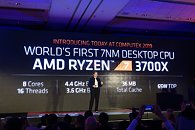
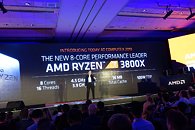
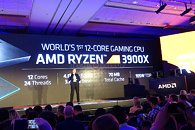
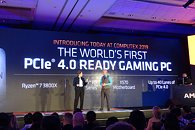


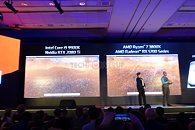
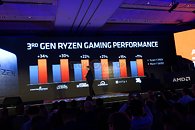
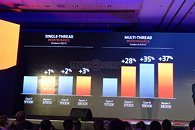
95 Comments on AMD Announces 3rd Generation Ryzen Desktop Processors
It'll come at a certain point.
In CR15 :
Ryzen 1800x = 161 so 3900x would be 212.52 which is above 9700K or below 9900K ( This link ) which hard to believe.
Also MT for 1800X = 1637 so 100% would be 3274.
sure those numbers are awesome, but one thing is that AMD's IPC is now above (at least Broadwell)
1: Waiting for chip availability. This SKU will require top bin chips (low power at high clocks). Those are being taken by EPYC ATM, and ensuring availability of more mainstream chips at launch is more important. After all, the 12c can use chiplets with disabled cores, so it only limits Ryzen 5 production. A 16c SKU would take a significant chunk out of the available silicon for Ryzen 7.
2: Holding off to see what Intel does. Launching a high-clocked 16c32t monster just as Intel prepares to launch their next generation of ... 10-core? 14nm++++++++ chips would be a smart move.
3: Holding off due to RAM being the main bottleneck and wanting to put their best foot forward. AM4 means dual-channel DDR4, so even with an improved IMC, feeding 16 fast cores would be difficult. A 16-core would still be a monster for fitting workloads, but it might not be the best PR move to launch a flagship that doesn't excel in gaming applications - and after all, the highest SKU you launch is going to be the most talked-about. As such, it makes (far) more sense to stick with lower core count chips to begin with, to show off gains in these use cases, and then launch the 16c SKU later for "semi-workstation" builds.
Personally, I think it's likely a mix of allt three. There are likely more factors coming into play too.Zen(1).Source.
Amd trying to Do The higheste clock speed on 1/2 core out of The box always.
So all core 4.5GHz = 9900k all core 5GHz
4.6GHz = 9900k 5.1GHz .
If 3800x going 5GHz, that will be = 9900k at 5.55 GHz
That 12 core, 5Ghz claim seems like blind optimism now. Yet it was spouted by a few channels.
Still, these chips look good. Waiting for reviews. And seeing Intel push out a 'special' 9900 is quite funny. Reviews required for an AMD, Intel head to head on their best 8 core parts...
They should work with new core and in mean time to sell Skylake, Coffee Lake, etc to try to stay with AMD in track...
No, Intel offer much more expensive i9-9900K, you can buy two 2700X.
How Intel sell one i9-9900K for price of two 2700X that's questions for buyers.
What they could OC him 500MHz...
Increase frequency of processors only on few cores, less than processor have is not real overclocking.
Because you get better performance only in some situations.
Also, for those considering whether this is a worthy upgrade from Zen+, you're doing it wrong. This is shaping up to be a worthy upgrade from anything but Zen+ instead. Zen+ -> Zen2 may be worth it for some, but I expect that scenario to be very situational.
In relation to the rumors, only the deluded ones wanted to believe in them!
3600 vs 8700k or even 9700k
3700x vs 9900k
3900x vs 9900k
3900x vs 9920x
3900x vs 2920x
-Cinebench is a very specific workstation load. While it's an okay general predictor of overall performance, it's a poor predictor of some things (like gaming performance).
-Ryzen traditionally does well in Cinebench compared to Intel.
-Clock scaling is not necessarily linear.
-We don't know all-core turbo speeds of these new Ryzen chips. Though I'm hoping they're as high as it looks even with "normal" cooling. Nor do we know the power limits/cooling/BIOS settings of the demoed Intel chips, which can affect performance quite a lot.
Still, even if we give Ryzen a 10% advantage over Intel in Cinebench performance when compared to other tests, matching the 9900K at lower clocks is very impressive. It's hard to see how this would fail to come very, very close to it across the board.
Heatsinks included? ^
Things looking better and better for AMD and for us.
Some software are specifically optimized / poorly optimized for certain CPU type.
We all know Ryzen processors do well in Cinebench in multi threaded workload.
However matching Intel CPU in Cinebench in Single threaded test is something past generation Ryzen processors never achieved.
Of course, assuming these numbers on today's ppt are real.